Did Portugal's dictator Salazar order killing of rival?
- Published
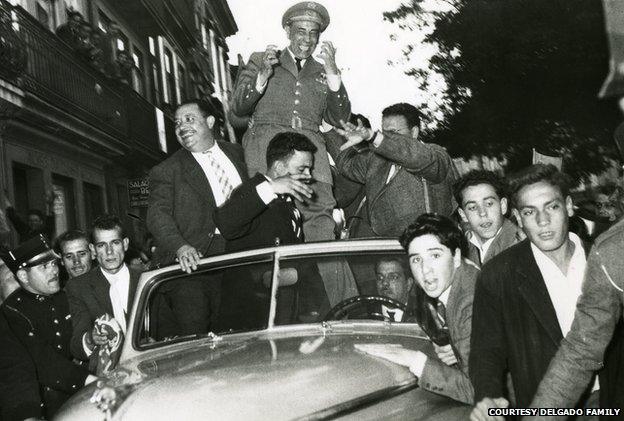
Gen Delgado was greeted by some 400,000 people in Oporto in 1958, one of Portugal's biggest political rallies
It was the most notorious political crime in Portugal's modern history, and 50 years on no-one has ever gone to jail for it.
On 13 February 1965, a charismatic opponent of the Portuguese nationalist dictatorship, Gen Humberto Delgado, was assassinated over the border in rural Spain.
His grandson, Frederico Delgado Rosa, believes he was deliberately disposed of by the regime of Antonio de Oliveira Salazar.
Salazar's government said it was the accidental death of a political exile, but historians increasingly see it as proof that Portugal's dictatorship was a ruthless and bloodthirsty regime.
"Salazar always managed to retain this image of being a saintly figure, the good dictator, but he was aware of General Delgado's murder and covered it up," says Mr Delgado Rosa, an academic who has written a biography of his grandfather.
One morning in April 1965, two teenage boys went looking for birds' nests from Villanueva del Fresno, a Spanish village 5km (three miles) from the Portuguese border, and 202km east of Lisbon.
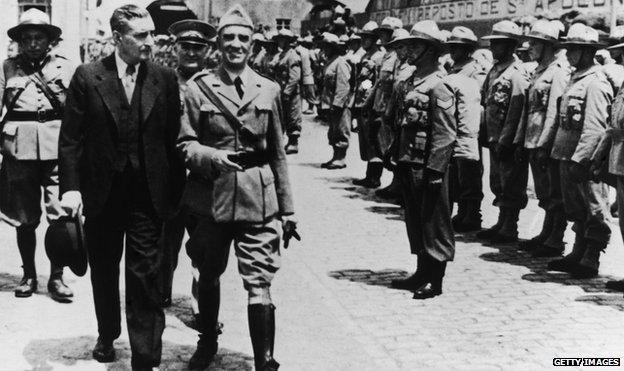
Salazar, seen here in 1950 (L), established an iron grip on Portugal after 1932
What they stumbled on instead, in a patch of eucalyptus trees, were the decomposed remains of Humberto Delgado and his secretary and long-term lover, a Brazilian woman named Arajaryr Campos.
How had a highly decorated air force general, who once ran for Portugal's presidency, ended up dead in Spain's rural western region of Extremadura?
The answer lies in Delgado's brave anti-Salazar stance and the popularity it earned him.

Portugal: Dictatorship to democracy
1926: Army overthrows government
1928: Antonio de Oliveira Salazar appointed finance minister
1932: Salazar becomes prime minister, assuming authoritarian powers under a 1933 Constitution which forms his Estado Novo (New State)
1939-45: Portugal maintains official neutrality during World War Two, but allows the UK to use air bases in Azores
1968: Salazar is succeeded by Marcello Caetano
1974: Dictatorship is overthrown in Carnation Revolution
1986: Portugal joins European Economic Community (now EU)

After declaring his candidacy in the 1958 presidential election, Gen Delgado was asked what he would do with Salazar if he became president. "Obviously, I'll sack him," was his reply.
Delgado became known as the "Fearless General" and thousands flocked on to the streets of Oporto to see the man promising to break the iron grip that Salazar had established on Portugal since becoming prime minister in 1932.
Marked man
When Delgado returned to Lisbon, the police broke up the multitude that had gathered at the station to meet him.
He was defeated in the 8 June election by official candidate Americo Tomas under dubious circumstances. Salazar's government had ordered that opposition representatives were not to attend the ballot counts.
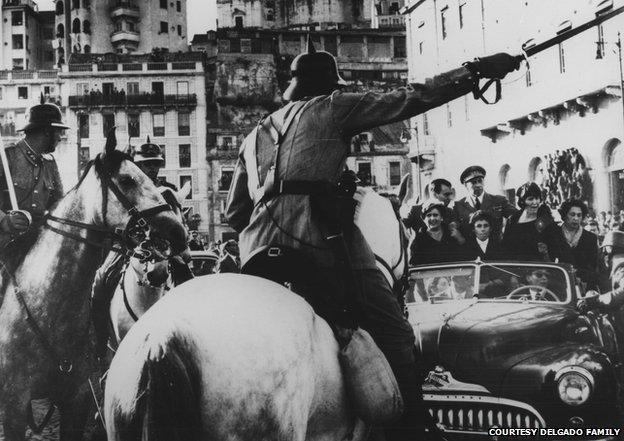
In May 1958, Gen Delgado, his wife and daughters were stopped by police from joining supporters in Lisbon
Delgado's brief dalliance with popularity made him a marked man.
He was dismissed from the military, and therefore lost his immunity from Salazar's PIDE secret police force.
Leaving his wife and three children in Lisbon, he flew to Brazil in April 1959.
Later that year he visited Britain and returned in 1964, addressing political leaders and the media in a country he knew from World War Two bilateral co-operation.
Delgado flitted between Brazil, Algeria and Angola, where an anti-colonialist uprising was starting. In late 1961, he briefly slipped back into Portugal to lead an abortive military coup.
Finally, in February 1965, Delgado travelled to Spain convinced that he was going to meet "revolutionary Portuguese officers".
In reality, the four men who picked up Delgado and his secretary at Badajoz station just inside the Spanish border were PIDE secret police.
They were part of a plot called "Operation Autumn", which the instigators would later say was aimed at capturing the general to make him stand trial in Portugal.
According to one of the four-man team, Ernesto Lopes Ramos, another PIDE agent Casimiro Monteiro unexpectedly shot Delgado before disposing with his Brazilian secretary, Arajaryr Campos, in the same fashion.
Monteiro fled to South Africa and was found guilty in absentia by a military court in 1981, the judges in effect backing the PIDE version that their orders had been not to kill Delgado but put him on trial.

Humberto Delgado
Born in 1906, Humberto da Silva Delgado participates in successful 1926 military coup that paved way for Salazar era
1958: Stands in presidential election, officially winning just 24% of the vote
In exile, Delgado president of Portuguese Patriotic Liberation Front in the hope of ousting Salazar
1965: Assassinated, remains found over border in Spain
1990: Remains lie in Portugal's National Pantheon

While researching his book, Humberto Delgado: Biography of the Fearless General (2008), the general's grandson came across a copy of the post mortem examination, supplied by Spanish authorities to the Lisbon court, which concludes that Delgado was beaten to death.
This evidence, and other forensic studies of the crime scene, were ignored by a court whose purpose, according to Frederico Delgado Rosa, was "to preserve the figure of Salazar".
Asked if he believes Salazar ordered the killing, the general's grandson says he gave his secret police a "blank cheque" to deal with the matter.
"I don't think he would take the risk of pronouncing an explicit order. That could have consequences and he was always cautious," he said.
Award-winning Portuguese historian Irene Pimentel agrees that Salazar's role was "all-important" in the crime.
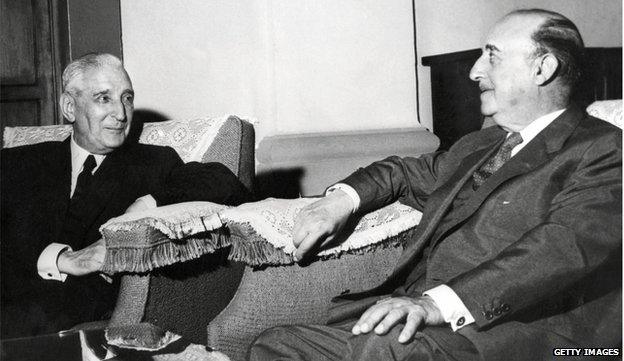
Portuguese are still assessing the legacy of Salazar (L), here with Spain's Gen Francisco Franco in 1960
"We mustn't think that PIDE was a state within a state; it responded to the leadership."
Democratic Portugal is marking 50 years since the assassination, a dark stain on the Salazar regime.
Although Portuguese condemn the repressive practices of the PIDE, not everyone is willing to condemn Salazar's regime as an entirely dark episode in the country's history.
"We still haven't properly discussed Salazar's legacy in Portugal," says Pedro Lains, an economic history professor at the University of Lisbon.
"People are divided on it according to their political preferences. The left argues it's a terrible legacy, whereas the right says Salazar made mistakes but was not bad overall."
However, Lisbon council has now made an unambiguous statement in favour of the general, announcing that the city's airport will be renamed Aeroporto Humberto Delgado, as long as the Portuguese government gives its blessing.
And a ceremony is being held in his honour.
Portugal's murdered air force hero may finally be winning the popular approval he craved.
- Published26 April 2014
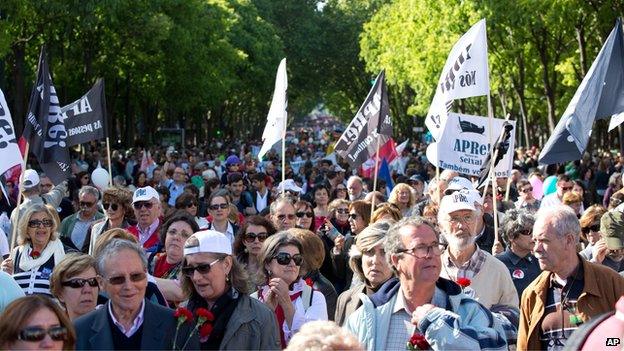
- Published9 December 2022